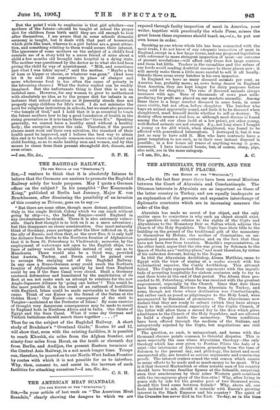exposed through faulty inspection of meat in America, your writer,
together with practically the whole Press, misses the great lesson these exposures should teach to put our own house in order.
Speaking as one whose whole life has been connected with the meat trade, I do not know of any adequate inspection of meat in England, except in a few large towns, and any proposed legislation with reference to more stringent inspection of meat—an outcome of present revelations—will affect only those few large centres, and them but little. Traders in the casualties and the refuse of our herds avoid sending doubtful carcases to these places now ; it will merely make them a little more careful to sell it all locally. Outside these areas every butcher is his own inspector.
In England we have as many diseased animals per cent. as America has, probably more; as, cows being dearer in England than America, they are kept longer for dairy purposes before being sold for slaughter. The rate A diseased animals always increases with age. Tens of thousands of cows past milk- producing for profit are placed on our markets annually. Among these there is a large number diseased in some form, in some cases visible, but not often, before slaughter. The butcher who buys an animal apparently sound, and finds it to be diseased when slaughtered, must himself decide whether to sell or destroy. To destroy often means a real loss, as although most disease is found among the old cow class (sold at a low price), yet other young, well-fleshed animals are not exempt. E.g., not long since I bought a young ox for .£19 which, when slaughtered, was found to be affected with generalised tuberculosis. I destroyed it, but it was just as easy to have sold it. Men who have contracts have a great temptation to use such, as in their case instant disposal is possible; in a few hours all traces of anything wrong is gone, consumed. I have instanced beasts, but, of course, sheep, pigs, also milk, are in the same category.










































 Previous page
Previous page